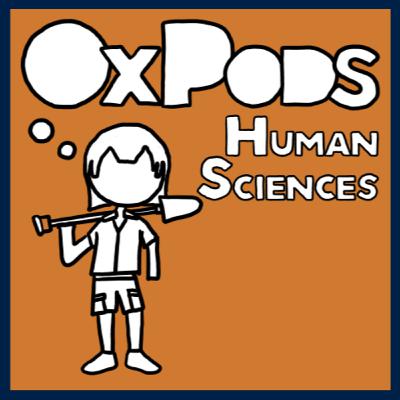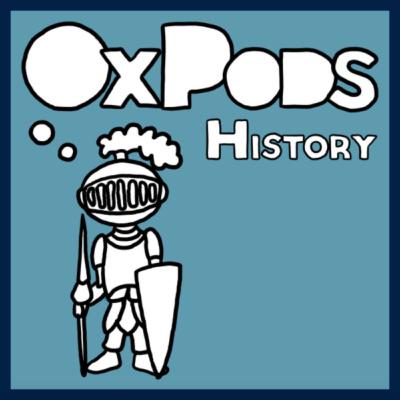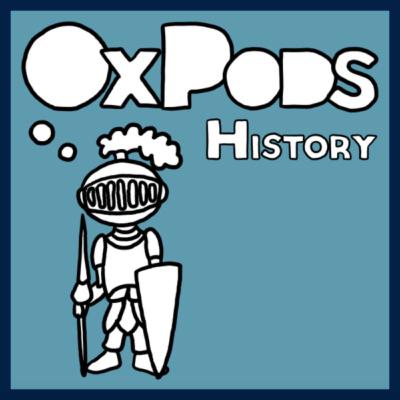Discover OxPods
OxPods

OxPods
Author: OxPods
Subscribed: 5Played: 30Subscribe
Share
© OxPods
Description
The podcast by Oxford students and their professors.
OxPods aims to create thought-provoking and easily digestible podcast episodes, made for anyone with an interest in the world around them. Each episode entails an Oxford student interviewing one of their world-leading professors on the niche, weird, and wonderful of their subjects. With episodes exploring the nooks and crannies of the Natural Sciences, English, History, Human Sciences, and PPE, OxPods has something for everyone.
If you would like the transcript of an episode, please get in touch with us via email - contact@oxpods.co.uk
OxPods aims to create thought-provoking and easily digestible podcast episodes, made for anyone with an interest in the world around them. Each episode entails an Oxford student interviewing one of their world-leading professors on the niche, weird, and wonderful of their subjects. With episodes exploring the nooks and crannies of the Natural Sciences, English, History, Human Sciences, and PPE, OxPods has something for everyone.
If you would like the transcript of an episode, please get in touch with us via email - contact@oxpods.co.uk
86 Episodes
Reverse
Darwin’s theory of evolution and selection states that characteristics which aid survival and reproduction will be favoured, however, this doesn’t only refer to physical attributes, but also behavioural ones. But how do behaviours arise, how do they spread through populations, and what role do they play in developing animal cultures?
In this episode of OxPods, biology PhD student Joe Woodman will be interviewing Dr Josh Firth, a research fellow at the University of Oxford whose research aims to understand how behaviour and ecology shapes social structure in societies.
When infectious diseases sweep through human populations, they can often bring detrimental effects to the health and functioning of society. But why do the pathogens that underpin these diseases require human hosts? Why do they cause illness? And importantly, can we predict how they will spread through populations?
In this episode of OxPods, biology PhD student Joe Woodman will be interviewing Professor Sunetra Gupta, a theoretical epidemiologist who uses mathematical models to determine the evolution, diversity and spread of pathogens.
The microbiome refers to the community of microorganisms living inside a host. But why are they there? What benefits can these microbes provide to their hosts? And could they enable their hosts to colonise new niches?
Alex Rodway, biology master’s student at Jesus College, will be discussing these questions with Dr Sarah Knowles, Associate Professor of Ecosystem Biology and Tutorial Fellow of Keble College, whose research focusses on the mammalian microbiome.
In eighteenth-century England, while famous writers such as Alexander Pope and Jonathon Swift were making a living through their published works, a small but growing number of women also started to live by their pens. However, because of the way women were perceived in the public sphere, they were not able to write about themselves in the way men did. In 2017, Professor Christine Gerrard gave the keynote address at the BAKEA conference in Turkey entitled ‘Memory and the Eighteenth-century Female Poet’. In this talk she discussed the difference between memory as expressed by male and female poets of this period, and this sparked an interest in women and memory that Professor Gerrard has been pursuing ever since.
In this episode, Flora Symington, second year English student at Somerville College, will be interviewing Professor Gerrard, Fellow and Tutor in English at Lady Margaret Hall, about her work in this area.
Have you ever wondered about the origin of Romance? Maybe your mind turns to Austen and Bronte? Really it's lineage is far longer, spreading back to the High Middle Ages and stories of King Arthur and Sir Gawain.
In this episode, Ursula White, a second year English Student at Somerville College, discusses the varied and fascinating world of Medieval Romance with Professor Laura Ashe, a renowned scholar of Medieval literature, history and culture, and frequent guest on the BBC Podcast in Our Time.
In the 6th century BCE, coins were first minted in Asia Minor (modern-day Turkey). Despite over 2500 years of human history, coins have continued to be a part of everyday life. Why were they invented? Why were they so successful? And what role has coinage played in the development of human history?
In this episode, Alice Hazell, a Classical Archaeology and Ancient History student at Lady Margaret Hall speaks to Dr. Volker Heuchert, research lecturer in Greek coinage and the curator of Greek and Roman provincial coins at the Ashmolean Museum, to learn about the invention of coins and its impact on the world.
Have you ever heard the term ‘women’s writing’ and wondered what it actually means - writing by women, writing for women, writing about women? While this term is increasingly prevalent in both popular culture and literary studies, it is difficult to define and has sparked much critical debate in recent years.
Flora Symington, English student at Somerville College, discusses this with Lorna Hutson, Professor of English Literature at Merton College and an expert on Early Modern literature, who’s recent lecture series here at Oxford asked this very question.
According to recent polls, the most well-known Shakespeare plays are Hamlet, Romeo and Juliet, and Macbeth, all of which are tragedies. Although Shakespeare wrote just as many comedies as he did tragedies, they simply are not as popular or widely read, and this trend applies to other playwrights of Shakespeare’s time as well.
Flora Symington, English Literature student, asks world-renown drama expert and Professor of Shakespeare, Emma Smith, why this is the case, and why she thinks we could all do with spending a bit more time with comedies.
The modern British welfare state can trace its roots back to the reign of Elizabeth I. But how did the state assist the poor in the Tudor period compared to now? Was the Victorian workhouse all that Dickens cracked it up to be? Where did our NHS come from?
In this episode, Charlie Bowden, a History student at Jesus College, interviews Dr Gillian Lamb, Stipendiary Lecturer in History at Somerville College, about the history of poor relief in Britain from the sixteenth century to today.
Obesity and increasing rates of overweight pose a growing issue in global health today. Why are more people gaining more weight, when its health burden seems so clear?
Miya McFarlane, a Human Sciences undergraduate at Regent’s Park College, discusses the social and cultural roots of obesity with Professor Stanley Ulijasek, a professor of human ecology whose two strands of research are Nutritional anthropology and Obesity. He is also currently the Director for the Unit of Biocultural Variation and Obesity. (edited)
Industrialisation in the 19th century prompted a ‘chromo revolution’, as the development of new artificially-produced paints provided new ways to experience and depict colour. Paul Gauguin used this colour development in new ways to visualise (and stereotype) the French colonial landscape. Born in 1848, Gauguin has been the subject of public interest and controversy since the late 20th century, as the focus of several blockbuster exhibitions. Gauguin’s time in Tahiti is notorious, but less well known is the period he spent in Martinique, then a French colony, which he visited in 1887.
Mia Thwaites, a history finalist at St John’s College, will be interviewing DPhil student Helena Erikstrup to explore Gauguin’s artwork in Martinique alongside wider themes of empire, histories of connection, and European-Caribbean visual culture.
Over the past few decades, US politics has become increasingly polarised, resulting in the emergence of a highly fractured political landscape, exemplified by the storming of the Capitol in January 2021. How did American politics become so polarised? What are the origins of these divisions? And how do we define what it means to be an American today?
To find out, in this episode of OxPods, Katerina Zagurova, history student at The Queen´s College, will be interviewing Dr Bruce Shulman, the Harmsworth Visiting Professor of American history, whose research on 20th century US history focuses on the relationships between political and broader cultural change.
At some point in human evolutionary history, our ancestors made a switch from a predominantly hunter-gatherer lifestyle to an agricultural one. When did this transition happen? Did farming start in one place and spread across the globe or, instead, have multiple independent origins? Why were certain plants and animals cultivated while others weren’t?
To find out, Alex Rodway, a biology master’s student at Jesus College, will be discussing the origins of agriculture with Dr Timothy Walker, a lecturer in plant sciences at Somerville College and former director of the University of Oxford Botanic Garden and Harcourt Arboretum.
As result of global Covid lockdowns and satisfying videos on TikTok, pottery has experienced a new revival. With thousands of years of history behind the practice, what benefits might it have in store? And why might it just be the hobby of the future?
In this episode, Alice Hazell, Classical Archaeology and Ancient History (CAAH) student at Lady Margaret Hall, will be interviewing Cathy O'Brien, an archaeology DPhil candidate at Keble college, who has used theories of cognitive archaeology and anthropology to research how people have been potting during the pandemic and its effect on our wellbeing.
When the world was brought to a halt by the COVID-19 pandemic, individuals all over the world stepped up to the job of saving lives and ‘bringing normal back again’. In Oxford, Dr Adam Ritchie was one of them.
In this episode of OxPods, Miya McFarlane, Human Sciences undergraduate at Regents Park College, interviews Dr Ritchie, a senior programme manager of the Oxford-AstraZeneca mass vaccine program, on how he helped vaccinate people all over world.
Street art strays far away from traditional art in a number of ways. However, its recent recognition as an art form leaves us wondering what is it that makes art art? What are the roles of art? And how does the valuation of art function? What, exactly differentiates vandalism from street art?
In this episode of OxPods, Philosophy and French student Ines Ghalia interviews Dr Macs Smith, Fellow in French at The Queen’s College and author of Paris and the Parasite to learn about the transgressive and complex nature of Street Art.
Marriage is an evolving concept: legislation to allow same-sex marriage in England and Wales was only passed in the United Kingdom 2013 and took effect in 2014. It’s evolving nature prompts some important questions: what is the point of marriage? Is marriage as an economic contract compatible with the instability of a romantic relationship? How long will marriage as an institution survive?
In answering these questions, this episode of OxPods will look into the role of marriage in society, the nature of love and commitment, and the ethical and political implications of marriage as one of the most fundamental human relationships. Sophia Herbert, a PPE student at New College, will be interviewing Dr Scot Peterson, author of 'Legally Married: Love and Law in the UK and the US', a Politics Lecturer at Corpus Christi College, who's research on the constitutional history of the UK and US has focused particularly on matters arising from the relationship between the church and state.
Common to Christianity, Judaism and Islam is the concept of an all-powerful, all-knowing, and benevolent God. Surely, then, this God knows everything you have done and everything you will do in your life. This raises a profound philosophical problem: is there free will within an Abrahamic context if God knows our future? Why doesn’t God intervene if He knows one will never find religion?
Join Katie Peachey, a second year Philosophy and Theology student from St Peter’s College, and Dr Tim Mawson, Edgar Jones Fellow and tutor in Philosophy at St Peter’s, as they discuss these pressing issues.
Last summer, the US Supreme Court overturned Roe v. Wade, reigniting a fifty-year abortion debate once thought settled in the Western world. Though disguised by coverage of judges and commentators alike, the crux of the debate remains deeply philosophical: what is the moral value of a foetus? Is it a human being? Is it a person?
To answer these questions, Todd Horton, law graduate from Trinity College, will be interviewing Professor Jonathan Herring, a pre-eminent exponent of the ‘relational’ conception of personhood, and author of the leading textbook on Medical Law.
How do religious communities engage with questions of empire, power, peace, and political action? And what can these debates tell us about global histories of non-violence? I’m Robert Taylor, a History DPhil student at New College, researching the post-1945 British counterculture’s interest in India. Today I’m joined by Floris de Ruiter, a PhD candidate at the Institute for History, University of Leiden, whose research examines intellectual debates around violence and non-violence within ashram communities. In this episode, we’re exploring ashrams and the history of ideas about violence and non-violence in 20th-century South Asia.





















